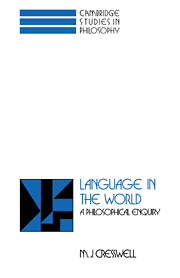
-
Select format
-
- Publisher:
- Cambridge University Press
- Publication date:
- October 2009
- March 1994
- ISBN:
- 9780511520037
- 9780521445627
- 9780521046213
- Dimensions:
- (216 x 138 mm)
- Weight & Pages:
- 0.332kg, 172 Pages
- Dimensions:
- (216 x 138 mm)
- Weight & Pages:
- 0.239kg, 172 Pages
You may already have access via personal or institutional login- Series:
- Cambridge Studies in Philosophy
Book description
What makes the words we speak mean what they do? Possible-worlds semantics articulates the view that the meanings of words contribute to determining, for each sentence, which possible worlds would make the sentence true, and which would make it false. M. J. Cresswell argues that the non-semantic facts on which such semantic facts supervene are facts about the causal interactions between the linguistic behaviour of speakers and the facts in the world that they are speaking about, and that the kind of causation involved is best analysed using David Lewis's account of causation in terms of counterfactuals. Although philosophers have worked on the question of the connection between meaning and linguistic behaviour, it has mostly been without regard to the work done in possible-world semantics and Language in the World is a book-length examination of this problem.
Reviews
"The discussion is extremely thorough and clear, and the dedicated reader with almost no technical sophistication will be able to gain a solid grasp of the system. This is an admirable accomplishment." The Philosophical Review
Contents
Metrics
Full text views
Full text views help Loading metrics...
Loading metrics...
* Views captured on Cambridge Core between #date#. This data will be updated every 24 hours.
Usage data cannot currently be displayed.
Accessibility standard: Unknown
Why this information is here
This section outlines the accessibility features of this content - including support for screen readers, full keyboard navigation and high-contrast display options. This may not be relevant for you.
Accessibility Information
Accessibility compliance for the PDF of this book is currently unknown and may be updated in the future.


